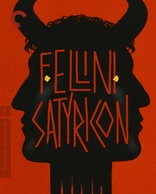Fellini Satyricon Blu-ray Movie
HomeFellini Satyricon Blu-ray Movie 
Criterion | 1969 | 130 min | Rated R | Feb 24, 2015Movie rating
7.1 | / 10 |
Blu-ray rating
| Users | 0.0 | |
| Reviewer | 5.0 | |
| Overall | 5.0 |
Overview
Fellini Satyricon (1969)
The exploits of two pansexual young men—the handsome scholar Encolpius and his vulgar, insatiably lusty friend Ascyltus—as they move through a landscape of free-form pagan excess.
Starring: Martin Potter, Hiram Keller, Max Born (I), Salvo Randone, Mario RomagnoliDirector: Federico Fellini
| Foreign | Uncertain |
| Drama | Uncertain |
| History | Uncertain |
| Fantasy | Uncertain |
Specifications
Video
Video codec: MPEG-4 AVC
Video resolution: 1080p
Aspect ratio: 2.37:1
Original aspect ratio: 2.35:1
Audio
Italian: LPCM Mono (48kHz, 24-bit)
Subtitles
English
Discs
50GB Blu-ray Disc
Single disc (1 BD)
Playback
Region A (locked)
Review
Rating summary
| Movie | 5.0 | |
| Video | 5.0 | |
| Audio | 5.0 | |
| Extras | 5.0 | |
| Overall | 5.0 |
Fellini Satyricon Blu-ray Movie Review
Reviewed by Dr. Svet Atanasov February 9, 2015Winner of Pasinetti Award for Best Italian Film at the Venice Film Festival, Federico Fellini's "Fellini Satyricon" (1969) arrives on Blu-ray courtesy of Criterion. The supplemental features on the disc include an original trailer for the film; archival interviews with the Italian director; archival interview with cinematographer Giuseppe Rotunno; new video interviews with classicists Joanna Paul and Luca Canali; new video interview with photographer photographer Mary Ellen Mark; Gideon Bachmann's documentary film "Ciao, Federico!' (1970); and more. The release also arrives with an illustrated leaflet featuring Michael Wood's essay "Not Just Friends". In Italian, with optional English subtitles for the main feature. Region-A "locked".
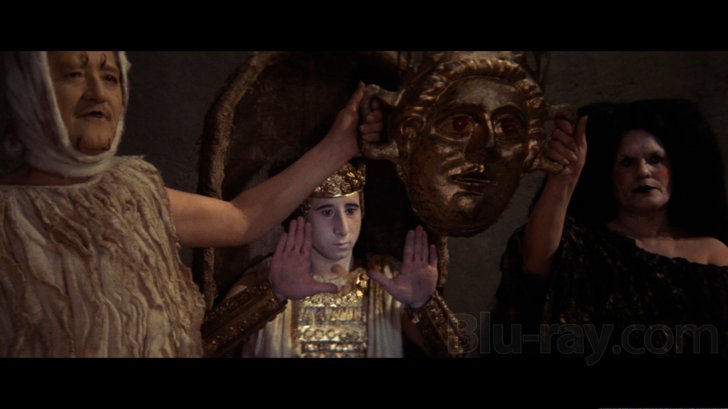
"Who is more fortunate than we who can witness our divine Caesar's new miracle?"
The film is inspired by the explicit novel by Gaius Petronius, a courter during the reign of Nero, but it is essentially a large collection of imagined events. Federico Fellini once described it as a "documentary of a dream."
The narrative is broken into nine episodes. There are no conventional stars, but the camera follows closely three characters that appear in each episode: Encolpius (Martin Potter, The Marquise de Sade's: Justine), a clever student, Ascyltus (Hiram Keller, A Real Young Girl), a temperamental and unpredictable troublemaker, and Gitone (Max Born), a beautiful young boy. Encolpius and Ascyltus are both attracted to Gitone and are trying to win his heart.
The rituals and the minor conflicts in each episode are difficult to describe. The majority of the time it simply feels like one has entered a vivid nightmare populated with some of the oddest characters the mind can imagine. Occasionally there are short exchanges that identify opposing sides and their dilemmas, but the film is rarely interested in the resolutions. In fact, there are entire sequences where some of the exchanges -- either in Latin or Neapolitan -- are not even translated.
Without conventional stars and narrative, the film eventually forces one to study the faces. There are familiar shapes and colors, but the expressions can be quite confusing as well. Joy, fear, ecstasy and pain are revealed with a different type of intensity, often through body movement that looks completely incomprehensible.
There is plenty of explicit sex and some very graphic executions, but because of the overwhelming excess they don’t look as disturbing as they would have been in a conventional film. The sky also turns purple, but after a sea of blood is spilled during the worshipping of unknown pagan gods the confused mind easily accepts it as normal.
Fellini Satyricon is that kind of a film – fragmented, subversive, absolutely impossible to deconstruct with conventional logic. Indeed, if one attempts to identify a message, an idea that unifies its scattered pieces, one is guaranteed to walk away from it frustrated and disappointed. Simply put, there is too much in it that the mind cannot process unless the walls of logic are taken down.
Fellini completed the film in 1969, exactly four years after Juliet of the Spirits. At the time it was the most expensive project he had been involved with, and the first to be funded by a foreign party. The original title of the film proved quite controversial -- producer Alfredo Bini had already registered Satyricon for another period film to be directed by Gian Luigi Polidoro -- and producer Alberto Grimaldi and Fellini were forced to choose the current, admittedly less than ideal, title. (United Artists also purchased the distribution rights to Polidoro’s film and kept it off the market until Fellini’s film premiered in Rome and was then sold to international distributors).
Fellini shot the film with the great cinematographer Giuseppe Rotunno, who had collaborated with some of Italian Cinema’s greatest directors (Mario Monicelli’s The Great War and The Organizer, Lucino Visconti’s Rocco And His Brothers and The Leopard, Valerio Zurlini’s Family Portrait).
The eerie, wildly exotic soundtrack was created by award winning composer Nino Rota (The Godfather).
Fellini Satyricon Blu-ray Movie, Video Quality 
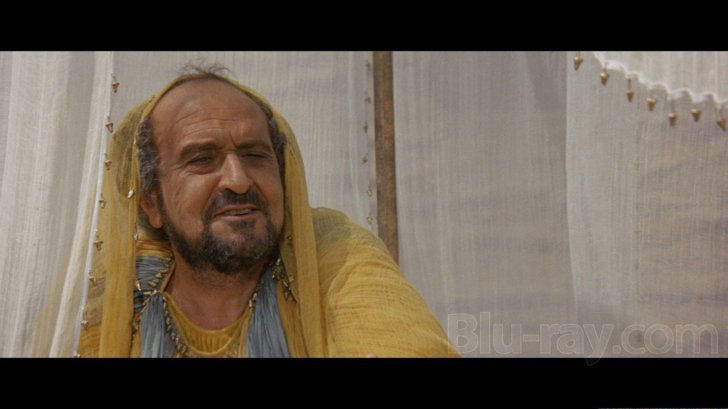
Presented in an aspect ratio of 2.37:1, encoded with MPEG-4 AVC and granted a 1080p transfer, Federico Fellini's Fellini Satyricon arrives on Blu-ray courtesy of Criterion.
The following text appears inside the booklet provided with this Blu-ray release:
"Supervised by director of photography Guiseppe Rotunno, this new digital transfer was created in 4K resolution on a Scanity film scanner from the 35mm original camera negative. Thousands of instances of dirt, debris, scratches, splices, and warps were manually removed using MTI's DRS and Pixel Farm's PFClean, while Digital Vision's Phoenix was used for small dirt, grain, noise management, and flicker. The original monaural soundtrack was remastered at 24-bit from the 35mm optical soundtrack positive. Clicks, thumps, hiss, hum, and crackle were manually removed using Pro Tools HD, AudioCube's integrated workstation, and iZotope RX 4.
Transfer supervisors: Lee Kline, Giuseppe Rotunno, Russell Smith.
Colorist: Sheri Eisenberg/Colorworks, Culver City, CA."
The 4K restoration has literally given this very colorful film a new life. While the fact that definition is so dramatically improved isn't surprising -- MGM's old R1 DVD release had numerous serious issues -- the far superior contrast, color reproduction and especially image depth make entire sequences look drastically different. The darker footage, in particular, now boasts wonderful depth, and one can easily see small details that are simply missing on the DVD release. The larger panoramic scenes also convey far better fluidity. Occasionally sharpness levels fluctuate, but these fluctuations occur when some unique decors are used or light is captured in a special way. Specific color enhancements with managed lighting also produce minor fluctuations. There are no traces of problematic sharpening or degraining corrections. However, because of the stylistic enhancements mentioned above, there are areas of the film where the grain can be underexposed (you can compare screencaptures #2 and 13 to see what type of variations are present). Overall image stability is excellent. In fact, I would like to specifically mention that various enhancements have effectively addressed the stability issues from the R1 DVD release (edge flicker, transitions, etc). Lastly, there are no encoding or compression anomalies to report in this review. All in all, this is a wonderful restoration of Fellini's film, which I feel confident will remain its definitive presentation on the home video market. (Note: This is a Region-A "locked" Blu-ray release. Therefore, you must have a native Region-A or Region-Free PS3 or SA in order to access its content).
Fellini Satyricon Blu-ray Movie, Audio Quality 
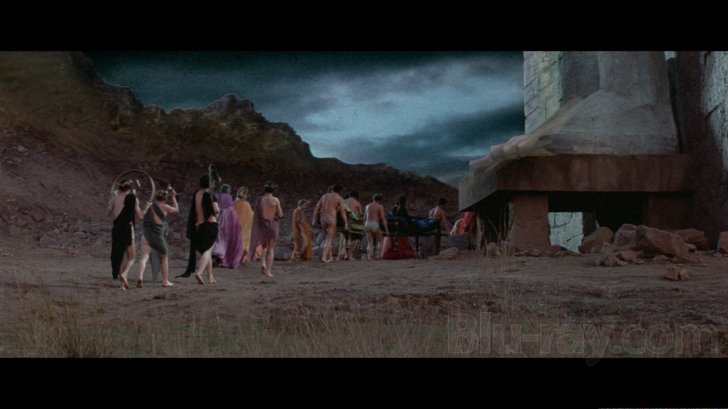
There is only one standard audio track on this Blu-ray release: Italian LPCM 1.0 (with portions of Latin and Neapolitan). For the record, Criterion have provided optional English subtitles for the main feature. When turned on, they appear inside the image frame.
It is clear that during the restoration various stabilization improvements have been performed. Indeed, even though there are select sequences where depth can fluctuate, the music and the dialog are very well balanced. Some viewers will probably notice that the syncing is fluid, but this is how the film was shot -- some actors were overdubbed and the sound does not always match the movement of their lips. Additionally, the Latin/Neapolitan exchanges are not translated in English, but this is how they should be experienced (see the long sequence around the 15.00.00 mark). There are no pops, cracks, problematic background hiss, audio dropouts, or digital distortions to report in this review. The English translation is excellent.
Fellini Satyricon Blu-ray Movie, Special Features and Extras 
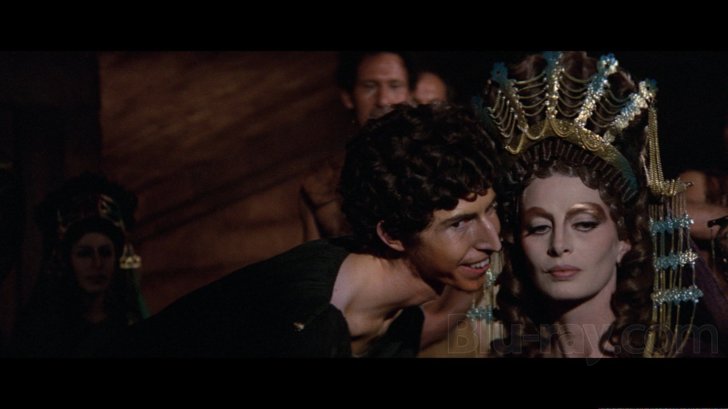
- Trailer - original trailer for Fellini Satyricon. In English, not subtitled. (3 min, 1080p).
- Commentary - this rather unusual but incredibly informative audio commentary is in fact a reading of Eileen Lanouette Hughes' 1971 memoir, On the Set of "Fellini Satyricon": A Behind-the-Scenes Diary. It offers detailed descriptions of the shooting of various segments from the film, the Italian director's initial vision of the film and its evolution during the production process, the casting of Martin Potter, Hiram Keller, and Max Born, the funding of the film (at the time Fellini Satyricon was the director's most ambitious project), some of the obvious discrepancies between Gaius Petronius' book and Fellini's interpretation of it, the interactions between the cast and crew members before and behind the camera, etc. The commentary was recorded exclusively for Criterion in 2014.
1. "The Fellinicon"
2. Hiram and Max
3. "How do you like my audience?"
4. Danilo Donati
5. Destroying the set
6. The opposite of restoration
7. A faithful fragment
8. Dentona/Cappitani/Giulietta
9. Luca Canali
10. "Roger Ebert, a journalist from Chicago"
11. Max's three fathers
12. A whale, tomorrow
13. Martin Potter
14. Hiram Keller
15. Ettore Bevilacqua
16. Shot and reshot
17. A transparent wall
18. Nino Rota
19. Petronius or not?
20. Whipping and swinging day
21. A unique device
22. Martin's dream
23. Communion
24. Frescoes
25. Conclusion
- Ciao, Federico! - this documentary film was produced by Gideon Bachmann in 1970. It features various clips from archival interviews with the legendary Italian director as well as plenty of archival footage from the shooting of Fellini Satyricon. In English and Italian, with optional English subtitles where necessary. (61 min, 1080p).
- Fellini - presented here are three excerpts from archival interviews with Federico Fellini in which he discusses the creative process and some of the common themes in his films.
1. Gideon Bachman (audio only), 1969 - in Italian, with optional English subtitles. (11 min, 1080p).
2. French Television, 1969 - the segment comes from the December 16, 1969, episode of JT de 20H. In French, with optional English subtitles. (2 min, 1080p).
3. Gene Shalit, 1975 - in English, not subtitled. (3 min, 1080p).
- Giuseppe Rotunno - in this archival interview, cinematographer Giuseppe Rotunno discusses his professional relationship with Federico Fellini (the two collaborated on nine different projects) and the unique production of Fellini Satyricon. The interview was conducted exclusively for Criterion in 2011. In Italian, with optional English. (8 min, 1080p).
- Fellini and Petronius - in this brand new documentary, classicists Joanna Paul, author of the article "Fellini-Satyricon: Petronius and Film", and Luca Canali, who served as an adviser on the movie, discuss Federico Fellini's unique adaptation of Gaius Petronius' explicit novel. The documentary was produced exclusively for Criterion in 2014. In Italian and English, with optional English subtitles where necessary. (24 min, 1080p).
- Mary Ellen Mark - in this video interview, photographer Mary Ellen Mark, who documented the production of Fellini Satyricon for Look magazine in 1968, discusses some of the photographs she took and her experiences at Cinecittà where Federico Fellini was shooting his film. The interview was conducted exclusively for Criterion in 2014. In English, not subtitled. (13 min, 1080p).
- Felliniana - presented here is a selection of Fellini Satyricon ephemera -- including posters, books, and programs -- was taken from Don Young's massive collection of Federico Fellini-related memorabilia, the Felliniana Archive. (1080p).
- Leaflet - an illustrated leaflet featuring Michael Wood's essay "Not Just Friends". (Michael Wood is the author of America in the Movies; Film: A Very Short Introduction, and Hitchcock: The Man Who Knew Too Much).
Fellini Satyricon Blu-ray Movie, Overall Score and Recommendation 
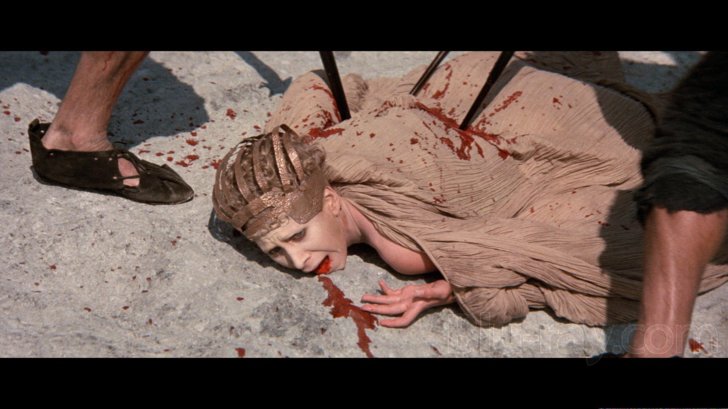
Arguably the wildest and most eccentric of Federico Fellini's films, Fellini Satyricon has been beautifully restored in 4K and looks simply stunning in high-definition. Criterion's upcoming Blu-ray release also offers an outstanding selection of new and archival supplemental features that offer plenty of invaluable information about the great Italian director and his working methods. Indeed, it is only February, but this very impressive release already has a guaranteed spot on my Top Ten list. VERY HIGHLY RECOMMENDED.
Similar titles
Similar titles you might also like

Intervista
Fellini's Intervista
1987

Variety Lights
Luci del varietà
1950

And the Ship Sails On
E la nave va
1983

I Vitelloni
1953

The White Sheik
Lo sceicco bianco
1952

Juliet of the Spirits
Giulietta degli spiriti
1965

Nights of Cabiria
Le notti di Cabiria
1957

Il Bidone
The Swindle
1955

La Strada
1954

Roma
Fellini's Roma
1972

La Dolce Vita
1960

Amarcord
1973

8½
Otto e mezzo / Federico Fellini's 8½
1963

A Ship to India
Skepp till Indialand / A Ship Bound for India
1947

Through a Glass Darkly
Såsom i en spegel
1961

The Silence
Tystnaden
1963

City of Women
La città delle donne
1980

Medea
1969

The Passion of Anna
En passion
1969

Dreams
Kvinnodröm
1955
